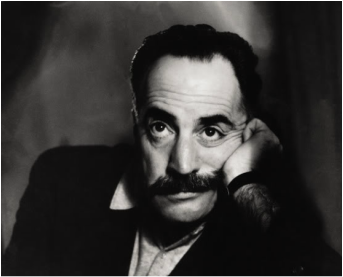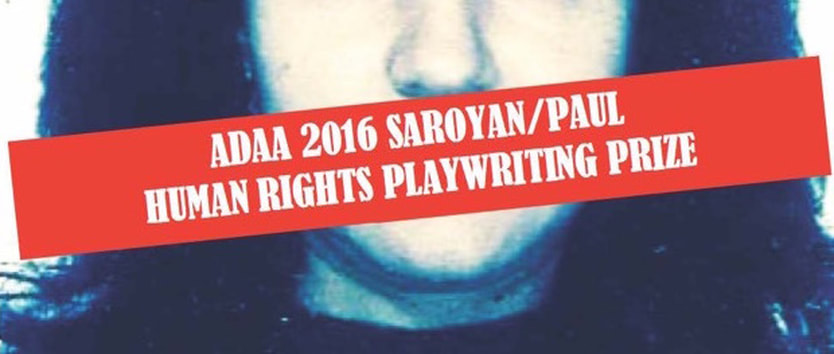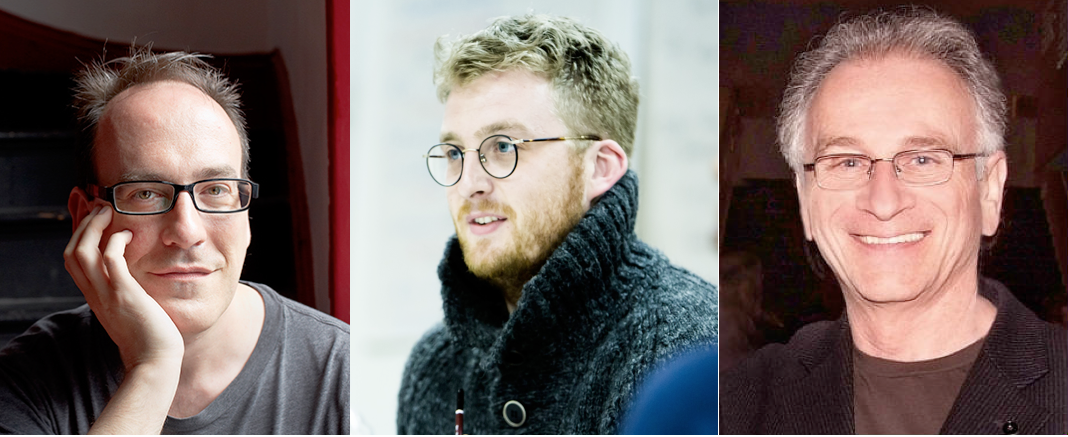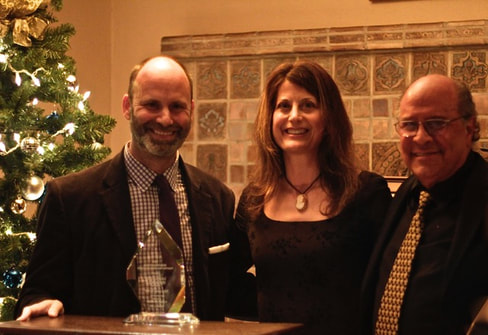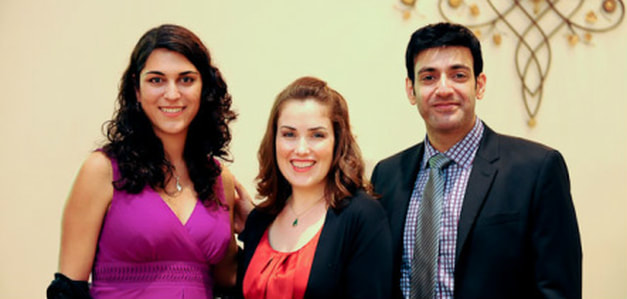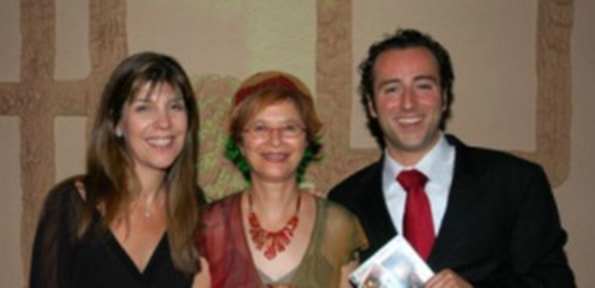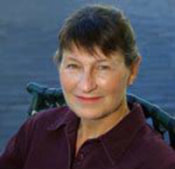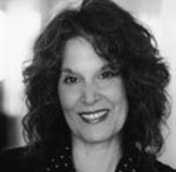ABOUT William Saroyan, playwright
"The Time of Your Life" 1939 Pulitzer Prize,
Tony Award and New York Critics Circle Award for Best Play
"In the time of your life, live -- so that in that good time there shall be no ugliness or death for yourself or for any life your life touches. Seek goodness everywhere, and when it is found, bring it out of its hiding place and let it be free and unashamed. Place in matter and in flesh the least of the values, for these are the things that hold death and must pass away. Discover in all things that which shines and is beyond corruption. Encourage virtue in whatever heart it may have been driven into secrecy and sorrow by the shame and terror of the world. Ignore the obvious, for it is unworthy of the clear eye and the kindly heart. Be the inferior of no man, nor of any men be the superior. Remember that every man is a variation of yourself. No man's guilt is not yours, nor is any man's innocence a thing apart. Despise evil and ungodliness, but not men of ungodliness or evil. Have no shame in being kindly or gentle. In the time of your life, live....so that in that wondrous time you shall not add to the misery and sorrow of the world, but shall smile to the infinite delight and mystery of it." |
COMING SOON: DATES FOR THE NEXT
SAROYAN/PAUL HUMAN RIGHTS CONTEST
ADAA IS PLEASED TO ANNOUNCE THE WINNER & FINALISTS FOR THE $10,000
2016 Saroyan/Paul Human Rights Playwriting Prize
WINNER
The Good Minister from Harare by June Carryl
A low-level bureaucrat is plunged into a nightmare wonderland of red tape, government thugs and revolutionary zealots after a visit from his father. When the past won't stay buried, do you turn a blind eye and live, or die a martyr in the bloody business of liberation?
FINALISTS
Gutting by Jeremy J. Kamps
Fourteen year-old Kali and her mother Eunice return to the Lower 9th Ward of New Orleans two years after Hurricane Katrina to find that “home” is no longer there. Despite the forces of systemic racism driving them away and apart, this mother and daughter learn that loving each other is both an act of resistance and renewal.
The Madres by Stephanie Alison Walker
It’s Buenos Aires, 1979. Two women search covertly for Belen, nine months pregnant and one of the many disappeared people in Argentina’s so-called “Dirty War.”
RUNNERS-UP
Paradise by Laura Maria Censabella
Yasmeen Al-Hamadi is a devout Yemeni-American Muslim girl at a struggling inner-city Bronx high school. Dr. Guy Royston is her disaffected science teacher, a former Evangelical with a mysterious past. An unlikely research team, together they embark on a neurological study, leading to stormy conflicts over love, faith and culture.
Doing Time by Jerry Goralnick
Based on actual events that took place in July and August of 1957 when Judith Malina, co-founder of The Living Theatre and Dorothy Day, co-founder of The Catholic Worker shared a cell for thirty days in the New York City Women’s House of Detention for protesting civil defense drills. All the incarcerated women in the House of Detention were twenty-year-old prostitute junkies and as they came to know who Dorothy was they would come to her and confess their life stories.
Zona Rosa by Carlos Morton
An activist medical doctor trying to spread awareness of the AIDS epidemic in 1980's Mexico City is murdured along with four other Gay men in a homophobic crime.
How to Conquer America by David Myers
In 1975, an un-proven research assistant created an ad campaign that turned a queer fermented-milk product into the 9 billion dollar a year phenomena it is today. Now, Arlene Hoffman, along with the ghost of her dead immigrant father, will tell us how she did it. A story of culture, appropriation, family, and the American Dream.
Bhuta/Kala by Nathaniel Sam Shapiro
Bhuta/Kala follows a troupe of Balinese Hindu religious theatrical performers, who simultaneously are perpetrating the Indonesian political genocide of 1965 while preparing and ultimately enacting the famous play of Barong and Rangda, a traditional tale of good versus evil. As the personal, political, and religious blend together, the play asks when neighbors take up arms against neighbors throughout history, what stories have perpetrators told themselves to enable their inhuman acts?
The Hunters by Jen Silverman
When a Vietnamese-American man kidnaps the grandson of the American soldier who killed his grandfather, he must confront the thin line between reparations and revenge. Can we ever find a way past the histories that determine our lives, or does history loom too large to ever be overwritten?
HONORABLE MENTIONS
|
People Like Us by Melanie Anne Ball
Otherland by David Cote When After All, It Was You and Me by Kevin Doyle Silence by Jason Grote Kidnap Road by Catherine Filloux |
This is Only A Test by Eric Reyes Loo
Sh ofu, Wianbu Pi by Lucy Sheen A Guide For The Homesick by Ken Urban How to Wear A Headscarf Tutorial (Part One) by Alannah Olivia |
THE 2016 ADAA SAROYAN/PAUL PLAYWRITING PRIZE JUDGES
NEIL MCPHERSON, ROB DRUMMER, SIMON LEVY
NEIL MCPHERSON, ROB DRUMMER, SIMON LEVY
Neil McPherson has been Artistic Director of the Finborough Theatre, London, since 1999, and has twice won the Best Artistic Director in the OffWestEnd Awards, as well as an award from The Writers' Guild for the Encouragement of New Writing. His first play. I Wish to Die Singing – Voices From The Armenian Genocide, was presented at the Finborough Theatre in 2015, and an excerpt was also performed concurrently in Los Angeles at The Kirk Douglas Theatre. I Wish to Die Singing won the Best Play Award, 2015, in the UK Studio Theatre Awards. The script is published by Oberon Books. Neil trained as an actor at The Royal Central School of Speech and Drama and the National Youth Theatre. |
Rob Drummer is a Dramaturg & Director who leads all new writing activities, playwright discovery/development at the Bush Theatre. He was the first Lit. Manager for HighTide Festival Theatre, where he discovered & developed playwrights including Luke Barnes, Laura Poliakoff, Vickie Donoghue & directed Luke Barnes’ Eisteddfod (Latitude), Endless Poem (London 2012 Festival) & Perish (HighTide & Public Theater, New York). Rob has worked with playwrights at theatres including The National Theatre, Hampstead Theatre, Bristol Old Vic, Contact, York Theatre Royal, Manchester Museum, Theatre 503 & Company of Angels,. He was one of the first recipients of an Artists’ International Development Fund from the Arts Council & British Council, travelling to South Africa to collaborate with theatres. |
Since 1993, Simon Levy has been the Producing Director for the Fountain Theatre. LA, where he's a director, playwright, & producer. He is the recipient of the Los Angeles Drama Critics Circle's Milton Katselas Career Achievement Award in Directing, & has been nominated for the Fichandler Award. His stage adaptation of The Great Gatsby, Finalist for the PEN Literary Award in Drama and published by Dramatists Play Service, has been produced internationally & is the only adaptation authorized & granted exclusive rights by the Fitzgerald Estate. His directing & producing credits include over 90 productions in LA & San Francisco with more than 200 awards. Recent directing credits include The Painted Rocks at Revolver Creek, Reborning, Cyrano, A House Not Meant to Stand, Opusand Photograph 51. |
ADAA WISHES TO THANK THE FOLLOWING CONTEST READERS FOR THEIR TIME
Sam Anderson, Mallery Avidon, Johnna Adams, Olu Alakija, Marcy Arlin, Chris Atamian, Richard Azurdia, Paul Baird, James Bennett, Jennifer Berry, Judy Braha, Danny Bryck, Barbara Cassidy, Lenora Champagne, Mia Chung, Karen Cogan. Catherine Coray, Clarence Coo, Emily Daly, Rachel Dart, Elizabeth Dement, Susan Diol, Julie Felise Dubiner, Padraic Duffy, Tanya Fuad, Emma Gibson, Marek Glinski, Ezzat Goushegir, Vicki Grise, Amie Hartman, Amina Henry, Bari Hochwald, Ellie Horne, Richard Horvitz, Ralph Gregory Hurst, Dan Hutton, Jonathan Josephson, Erin Kamler, John Kachoyan, Mayank Keshaviah, Lucinda Kidder,Lisa Kirazian, Vedrana Klepica, Zac Kline, Karen Kondazian, Kristen Lazarian, Erin Layton, Libby Leonard, Karin Magaldi, Jennifer Maisel, Jason Martin, Brian McCormack, Maedhbh Fiona McCullagh, Emily Mendelsohn, Nathaniel Merchant, Paul Meshejian, Megan Monahan, Victoria Monticello, Megan Murtha, Marcos Najera, Trey Nichols, Ann Noble, Ana-Rose O’Halloran, Lynne Olson, Tira Palmquist, Michael Peretzian, Dianne Philibosian, Jane Pickett, Robert Plowman, Corey Pond, Jesus Reyes, Julia Sanford, Megan Sandberg Zakian, Ova Saopeng, Hank Saroyan, Elizabeth Senja Spackman, Brooke Robinson, Alvaro Saar Rios, Emma Goldman Sherman, Misha Shulman, John Sloan, Gerard Stropnicky, Kelly Stuart, Melanie Sutherland, Janet S. Tiger, Alice Tuan, Kath Vandenberg, Brenda Varda, Thelma Virata de Castro, Kimiko Warner-Turner
2016 CONTEST Guidelines
|
MISSION
The new revised mission of the $10,000 2016 Saroyan/Paul Human Rights Playwriting Prize invites stimulating new works that explore socially and politically charged themes about Human Rights /Social Justice. Our aim is to harness theatre's ability to make a relevant impact on our global society today. We are looking for insightful and engaging plays that imaginatively interpret this aim - stories on injustice, inequality, and those reducing the human and environmental cost of violence and those finding new ways of promoting a healthier and more peaceful, harmonious global community. We aim to find artists with courageous voices, imagination, and stories that uphold human dignity. AWARDS
|
CONTEST COMMITTEE
SUPPORTING THEATERS
|
SUBMISSIONS
Our new guidelines above have been refined to reflect our new direction. Please consider carefully whether your script is likely to meet the criteria.
1. Contest is restricted to original plays written in the English language.
2. Worldwide submissions accepted.
3. All Submissions must be submitted electronically in the form of a PDF. You may submit more than one play in one cycle.
4. Scripts must have received a professional reading and/or workshop, but not a production prior to submission deadline, or be scheduled for one.
5. Plays must be full length (Min. of 60 mins.) and adhere to standard playwriting format.
6. No adaptations or children’s plays.
7. Plays must have Human Rights/Social Justice at heart. You may resubmit the same play in more than one cycle of the contest.
8. Submissions not following exact rules as stated will be disqualified.
9. Previous Winners and Nominees are eligible to submit again.
10. Only “invited” playwrights will be asked to submit scripts after sending in synopsis.
Our new guidelines above have been refined to reflect our new direction. Please consider carefully whether your script is likely to meet the criteria.
1. Contest is restricted to original plays written in the English language.
2. Worldwide submissions accepted.
3. All Submissions must be submitted electronically in the form of a PDF. You may submit more than one play in one cycle.
4. Scripts must have received a professional reading and/or workshop, but not a production prior to submission deadline, or be scheduled for one.
5. Plays must be full length (Min. of 60 mins.) and adhere to standard playwriting format.
6. No adaptations or children’s plays.
7. Plays must have Human Rights/Social Justice at heart. You may resubmit the same play in more than one cycle of the contest.
8. Submissions not following exact rules as stated will be disqualified.
9. Previous Winners and Nominees are eligible to submit again.
10. Only “invited” playwrights will be asked to submit scripts after sending in synopsis.
WRITERS SHOULD SUBMIT SCRIPTS THAT INCLUDE THE FOLLOWING
Works must examine Human Rights/Social Justice issues as a central and deliberate theme. We are unlikely to consider plays, for example, that deal with issues of personal freedoms without placing them in a wider political and social context. To be included in this contest, we suggest some thoughts to help determine whether your play falls within our parameters of consideration:
Play addresses issues that create barriers to social justice or dramatizes a social injustice:
• Supports life and dignity of the human person
• Influences attitudes of tolerance between and within racial groups
• Fosters new understanding and builds respect for cultural differences and identity
• Supports creative approaches to addressing issues of social justice/injustice
• Demonstrates the performing arts as a powerful tool and community resource for facilitating civic engagement and advancing social change
• Makes the audience bear witness to social injustice
• Inspires others to action against a social injustice
• Proposes solutions for social injustice
• Raises awareness of a little recognized social injustice or argues on behalf of an ignored human right
Scripts can tackle topics as diverse as homelessness, genocide, human exploitation, whether the conflicts are international, among groups and individuals, or through political participation. Scripts can also seek to create understanding of how conflicts can be resolved nonviolently instead of violently. Other themes can include minority issues that focus on racial, ethnic, and gender discrimination both in the United States and abroad, with writers making real and relevant the impact of human rights issues on our everyday lives. ADAA hopes this widened scope of the competition will help shed new light on spiritual, political, and cultural differences and issues and build respect for cultural expression and identity in a world that is experiencing rapid globalization and chaos. A play about the horrors of war, torture, oppression, religious intolerance, racism, genocide, gender discrimination, bearing witness to suffering, abuse of human rights are considered plays about Human Rights /Social Justice.
Works must examine Human Rights/Social Justice issues as a central and deliberate theme. We are unlikely to consider plays, for example, that deal with issues of personal freedoms without placing them in a wider political and social context. To be included in this contest, we suggest some thoughts to help determine whether your play falls within our parameters of consideration:
Play addresses issues that create barriers to social justice or dramatizes a social injustice:
• Supports life and dignity of the human person
• Influences attitudes of tolerance between and within racial groups
• Fosters new understanding and builds respect for cultural differences and identity
• Supports creative approaches to addressing issues of social justice/injustice
• Demonstrates the performing arts as a powerful tool and community resource for facilitating civic engagement and advancing social change
• Makes the audience bear witness to social injustice
• Inspires others to action against a social injustice
• Proposes solutions for social injustice
• Raises awareness of a little recognized social injustice or argues on behalf of an ignored human right
Scripts can tackle topics as diverse as homelessness, genocide, human exploitation, whether the conflicts are international, among groups and individuals, or through political participation. Scripts can also seek to create understanding of how conflicts can be resolved nonviolently instead of violently. Other themes can include minority issues that focus on racial, ethnic, and gender discrimination both in the United States and abroad, with writers making real and relevant the impact of human rights issues on our everyday lives. ADAA hopes this widened scope of the competition will help shed new light on spiritual, political, and cultural differences and issues and build respect for cultural expression and identity in a world that is experiencing rapid globalization and chaos. A play about the horrors of war, torture, oppression, religious intolerance, racism, genocide, gender discrimination, bearing witness to suffering, abuse of human rights are considered plays about Human Rights /Social Justice.
SCRIPT EVALUATION AND SELECTION PROCESS
To ensure impartiality and authenticity in the adjudication process, a double-blind system will be adopted. The identity of playwrights will be withheld from judging. Three finalists will first be announced. The identity of the winning playwrights will be released when the prize is announced. Participating writers agree to permit the use of their names, biographies and titles of their plays in all promotional materials. Decisions of the judges are final.
TO ENTER
CHECK OUT NOW
*If "Buy Now" paypal button does not work for you, please try Firefox Browser.
**Already have a paypal account? Send $20 fee to: [email protected]
To ensure impartiality and authenticity in the adjudication process, a double-blind system will be adopted. The identity of playwrights will be withheld from judging. Three finalists will first be announced. The identity of the winning playwrights will be released when the prize is announced. Participating writers agree to permit the use of their names, biographies and titles of their plays in all promotional materials. Decisions of the judges are final.
TO ENTER
- Submit by email 2 electronic PDF submissions to [email protected], the first with your name and the second without your name. (Any appearance of the playwright’s name, initials or other identifiable marks on any part of the blind script will disqualify the entry)
- The cover page of the first script must include – the title of the play, the playwright’s full name, address, email and phone number
- Please make $20 entry fee payment online at Paypal (button below)
- Script submission deadline will be announced
- Scripts must be in English and the original work of the author/s
- Scripts that do not meet submission guidelines will be disqualified
CHECK OUT NOW
*If "Buy Now" paypal button does not work for you, please try Firefox Browser.
**Already have a paypal account? Send $20 fee to: [email protected]
PAST CONTESTS
2014 SAROYAN PRIZE
WINNER
LAURA MARIA CENSABELLA, "CARLA COOKS THE WAR"
LAURA MARIA CENSABELLA, "CARLA COOKS THE WAR"
Pier Carlo Talenti (Lit. Director, CTG and Honorary Guest) , Laura Maria Censabella (Winning Playwright) , Hank Saroyan (ADAA Board Member)

JUDGES
SEBASTIAN BORN Ass. Literary Director, National Theatre, UK
ERIK EHN
Head of Playwriting, Brown University
DAVID LAN Artistic Director, Young Vic, UK
SEBASTIAN BORN Ass. Literary Director, National Theatre, UK
ERIK EHN
Head of Playwriting, Brown University
DAVID LAN Artistic Director, Young Vic, UK
FINALISTS
I Am Not Mine by Sevan Kaloustian-Greene
Manhattan by Mary Kathryn Nagle
Manhattan by Mary Kathryn Nagle
RUNNERS UP
Veritas by Betty Shamieh
Mr. America by Jules Tasca
The Family Steering Committee by Steve Karp
Mr. America by Jules Tasca
The Family Steering Committee by Steve Karp
Jury
Johnna Adams, Olu Alakija , Michael Arabian, Marcy Arlin, Michael, Barakiva, Brook Berman, Kimoko Broder, Barbara Cassidy, Josh Chambers, Gamal Chasten, Paula Cizmar, Christine Evans, Trish Hartineaux, Erin Kamler, Lisa Kirazian, Lucinda Kidder, Kristen Lazarian, Roberta Levitow, Ed Mast. Ruth Margraff. Emily Mendelsohn, John Moletress, Megan Monahan, Michael Peretzian, Michael Peretzian, Kathy Rucker, Deborah Salzer, Megan Sandberg-zakian, Adrian Sevan, Kelly Stuart, Alice Tuan, Enrique Urueta, Gary Winter, Tim Wright, Torange Yeghiazarian, Tanya Yerevanian
2012 Saroyan Prize
Winner
Kelly Stuart for
"Belonging to the Sky"
JUDGES
2010 SAROYAN PRIZE
WINNER
Silva Semerciyan for
"Another Man's Son"
2008 SAROYAN PRIZE
WINNER
Lilly Thomassian For"Nadia"
JUDGES
THE SAROYAN/PAUL HUMAN RIGHTS PLAYWRITING PRIZE
SUPPORTED BY
THE WILLIAM SAROYAN FOUNDATION
http://williamsaroyanfoundation.org/
ESTABLISHED BY WILLIAM SAROYAN - DECEMBER 30, 1966
The Foundation has overseen the archives of William Saroyan since Saroyan founded it in 1966. In the late 1990s the Foundation donated all of Saroyan’s literary papers to Stanford University Libraries, which now holds the William Saroyan Collection at the Department of Special Collections. The Foundation has also established various writing prizes to honor Saroyan’s legacy.
HAIG G. MARDIKIAN - PRESIDENT OF THE WILLIAM SAROYAN FOUNDATION - A graduate of Trinity College and Harvard Business School, Haig Mardikian is a longtime financial investment executive and current owner of Haig Mardikian Enterprises, a real estate investment firm. He is President of the William Saroyan Foundation in San Francisco, which was established by Saroyan himself. He serves on the Board of Overseers of the Hoover Institution at Stanford University and is a Trustee of the Herbert Hoover Foundation and Presidential Library Association. He is also President/Trustee of the Foundation of City College of San Francisco. His civic involvements around the Bay Area are numerous. He is married to Constance (Black) Mardikian and they have two children: daughter Sasha and son John Haig.
ROBERT SETRAKIAN - PAST-PRESIDENT OF THE FOUNDATION - ADAA honors the memory of Robert Setrakian
Businessman, Friend of Saroyan, and Past President of the William Saroyan Foundation, passed away on September 2, 2010 at age 86, instrumental in establishing ADAA’s William Saroyan Prize for Playwriting.
The Foundation has overseen the archives of William Saroyan since Saroyan founded it in 1966. In the late 1990s the Foundation donated all of Saroyan’s literary papers to Stanford University Libraries, which now holds the William Saroyan Collection at the Department of Special Collections. The Foundation has also established various writing prizes to honor Saroyan’s legacy.
HAIG G. MARDIKIAN - PRESIDENT OF THE WILLIAM SAROYAN FOUNDATION - A graduate of Trinity College and Harvard Business School, Haig Mardikian is a longtime financial investment executive and current owner of Haig Mardikian Enterprises, a real estate investment firm. He is President of the William Saroyan Foundation in San Francisco, which was established by Saroyan himself. He serves on the Board of Overseers of the Hoover Institution at Stanford University and is a Trustee of the Herbert Hoover Foundation and Presidential Library Association. He is also President/Trustee of the Foundation of City College of San Francisco. His civic involvements around the Bay Area are numerous. He is married to Constance (Black) Mardikian and they have two children: daughter Sasha and son John Haig.
ROBERT SETRAKIAN - PAST-PRESIDENT OF THE FOUNDATION - ADAA honors the memory of Robert Setrakian
Businessman, Friend of Saroyan, and Past President of the William Saroyan Foundation, passed away on September 2, 2010 at age 86, instrumental in establishing ADAA’s William Saroyan Prize for Playwriting.
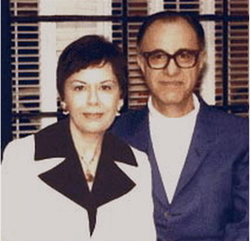
AND SUPPORTED BY
THE LILLIAN AND VARNUM PAUL FUND
The Saroyan/Paul award was established in honor of Paul's dedication to Armenian society and culture. In 2008, Varnum Paul died at age 100 from stroke complications. As a lawyer, civic leader and philanthropist, founding father of the western diocese of the Armenian Church Endowment Fund, Varnum Paul, along with his wife, Lillian, and daughter, Karen Kondazian, established a goal and honor for writers everywhere, for many years to come.
THE LILLIAN AND VARNUM PAUL FUND
The Saroyan/Paul award was established in honor of Paul's dedication to Armenian society and culture. In 2008, Varnum Paul died at age 100 from stroke complications. As a lawyer, civic leader and philanthropist, founding father of the western diocese of the Armenian Church Endowment Fund, Varnum Paul, along with his wife, Lillian, and daughter, Karen Kondazian, established a goal and honor for writers everywhere, for many years to come.

